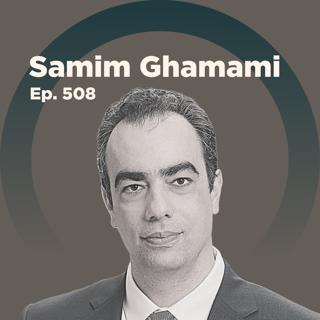
Derek Tang on the Present and Future Landscape for Fed Policy and Politics
Derek Tang is the CEO and co-founder of LH Meyer, and is part of the research team based in Washington, D.C. where he forecasts Fed policy developments, provides bespoke policy analysis to institutional investors, and also closely monitors and forecasts the Fed's balance sheet. Derek joins David on Macro Musings to talk about Fed policy, Fed politics, and what to expect in 2023 and 2024. Specifically, David and Derek discuss numerous personnel changes at the Fed, the future of the central bank's balance sheet, the upcoming Congressional agenda for the Fed, what the next framework review has in store, and more. Transcript for the episode can be found here. Derek's Twitter: @macroderek Derek's LH Meyer bio David Beckworth's Twitter: @DavidBeckworth Follow us on Twitter: @Macro_Musings Click here for the latest Macro Musings episodes sent straight to your inbox! Check out our new Macro Musings merch here! Related Links: *The Federal Reserve's Current Framework for Monetary Policy: A Review and Assessment* by Janice Eberly, James Stock, and Jonathan Wright *The Federal Reserve's Balance Sheet: Costs to Taxpayers of Quantitative Easing* by Andy Levin and Bill Nelson
13 Maalis 202352min

Joey Politano on Fed Policy, Inflation, and the Current State of the US Economy
Joey Politano is an economist and commentator who writes regularly on his Substack newsletter titled, Apricitas Economics. Joey is also a previous guest of the podcast, and he rejoins Macro Musings to talk about the state of the US economy, inflation, Fed policy, and much more. Specifically, David and Joey discuss the results of the Fed's ongoing rate hikes, the narrative that higher rates may lead to higher inflation, conducting monetary policy in a supply constrained economy, and more. Transcript for the episode can be found here. Joey's Twitter: @JosephPolitano Joey's Substack: Apricitas Economics David Beckworth's Twitter: @DavidBeckworth Follow us on Twitter: @Macro_Musings Click here for the latest Macro Musings episodes sent straight to your inbox! Check out our new Macro Musings merch here! Related Links: *America's 2022 Slowdown* by Joey Politano *The US Labor Market Was Stronger Than We Thought* by Joey Politano
6 Maalis 202353min

Peter Conti-Brown on the Legal and Regulatory Issues Facing the Fed and Financial Markets
Peter Conti-Brown is an associate professor of financial regulation and legal studies at the University of Pennsylvania and is a non-resident fellow at the Brookings Institution. Peter is also a returning guest to Macro Musings, and rejoins the podcast to talk about some of the big legal and regulatory issues facing the financial and monetary policy space today. Specifically, David and Peter discuss the debt ceiling crisis, Fed master accounts, the current state of cryptocurrency, the implications of the Federal Reserve Accountability Act, and the most significant court cases facing the central bank today. Transcript for the episode can be found here. Peter's Twitter: @PeterContiBrown Peter's UPenn profile The Wharton Initiative on Financial Policy and Regulation's website David Beckworth's Twitter: @DavidBeckworth Follow us on Twitter: @Macro_Musings Click here for the latest Macro Musings episodes sent straight to your inbox! Check out our new Macro Musings merch here! Related Links: *The Contingent Origins of Financial Legislation* by Peter Conti-Brown and Brian Feinstein *Let Crypto Burn* by Stephen Cecchetti and Kim Schoenholtz *Mint the Coin? Buy Back Bonds? 7 'Gimmicks' for Dodging the Debt Limit* by Jeff Stein Peter Conti-Brown's Bonus Segment with David Beckworth
27 Helmi 202352min

David Wilcox on the Debt Ceiling Crisis and the Crippling Costs of Default
David Wilcox is a non-resident senior fellow at the Peterson Institute for International Economics and is the Director of Economic Research at Bloomberg Economics. Previously, David served for many years on the staff of the Federal Reserve Board, as deputy director from 2001 to 2011 and as director from 2011 to 2018 of the Division of Research and Statistics. In the latter role, he functioned as the chief economist of the division, a senior advisor to three successive chairs of the board, and the division leader for strategic direction as well as chief manager. David joins Macro Musings to talk about a recent article he wrote titled, *The Cost of the US Going Over the Fiscal Cliff is Trauma, Then Unending Pain.* David and David also discuss the debt ceiling issue more broadly, including the severity and timing of a technical default, the two big economic shocks that would result from a default, the possible solutions to pursue in the face of the this debacle, and more. Transcript for the episode can be found here. David Wilcox's Twitter: @D_W_Wilcox David Wilcox's PIIE profile David Beckworth's Twitter: @DavidBeckworth Follow us on Twitter: @Macro_Musings Click here for the latest Macro Musings episodes sent straight to your inbox! Check out our new Macro Musings merch here! Related Links: *The Cost of US Going Over Fiscal Cliff Is Trauma Then Unending Pain* by David Wilcox *Fiscal Policy Under Low Interest Rates* by Olivier Blanchard *Mint the Coin? Buy Back Bonds? 7 'Gimmicks' for Dodging the Debt Limit* by Jeff Stein
20 Helmi 202351min

Julie Hill on the History and Recent Developments of Fed Master Accounts
Julie Hill is a professor of law at the University of Alabama's School of Law and she specializes in the study of the regulation of financial institutions. Julie also has a new paper out titled, *Opening a Federal Reserve Account,* and she joins Macro Musings to talk about the history and recent developments surrounding Fed master accounts. David and Julie also discuss the legal basis for these accounts and the numerous case studies surrounding them, including the Narrow Bank, Reserve Trust, Custodia, and more. Transcript for the episode can be found here. Julie's Twitter: @ProfJulieHill Julie's Alabama Law profile David's Twitter: @DavidBeckworth Follow us on Twitter: @Macro_Musings Click here for the latest Macro Musings episodes sent straight to your inbox! Check out our new Macro Musings merch here! Related Links: *Opening a Federal Reserve Account* by Julie Hill
13 Helmi 20231h

Macro Lit Review 3: Highlights from Early 2023 with George Selgin
George Selgin is a senior fellow and director emeritus of the Center for Monetary and Financial Alternatives at the Cato Institute. George is also a frequent guest on Macro Musings and he rejoins the podcast to talk about some recent developments in the monetary and fiscal policy space. Specifically, David and George discuss new narratives around shadow banking and the financial crisis, the fiscal cost of large central bank balance sheets, the return of secular stagnation, and a lot more. Transcript for the episode can be found here. George's Twitter: @GeorgeSelgin George's Cato profile David's Twitter: @DavidBeckworth Follow us on Twitter: @Macro_Musings Click here for the latest Macro Musings episodes sent straight to your inbox! Check out our new Macro Musings merch here! Related Links: *A Monetary Policy Primer: Parts 1-12* by George Selgin *Why Shadow Banking Didn't Cause the Financial Crisis* by Norbert Michel *The Federal Reserve's Balance Sheet: Costs to Taxpayers of Quantitative Easing* by Andy Levin and Bill Nelson *The Monetary Executive* by Christina Parajon Skinner *Secular Stagnation is Not Over* by Olivier Blanchard *The Hard Road to a Soft Landing: Evidence from a (Modestly) Nonlinear Structural Model* by Randal Verbrugge and Saeed Zaman *Brazil and Argentina to Start Preparations for a Common Currency* by Michael Stott and Lucinda Elliott *Floor Systems for Implementing Monetary Policy: Some Unpleasant Fiscal Arithmetic* by Aleksander Berentsen, Christopher Waller, and Alessandro Marchesiani *Fallen Heroes: Central Banks Face Credibility Crisis as Losses Pile Up* by Johanna Treeck *SNB Will Shrink Balance Sheet After Record Loss, Citigroup Says* by Bastian Benrath *George Selgin on False Dawn: The New Deal and the Promise of Recovery* by Macro Musings
6 Helmi 202349min

Michael Strain on Averting the Looming Debt Ceiling Disaster
Michael Strain is the Director of Economic Policy Studies and the Arthur F. Burns Scholar in Political Economy at the American Enterprise Institute and is a returning guest to Macro Musings. Michael rejoins the podcast to talk about the looming debt ceiling crisis and his recent article on the issue titled, *Averting a Debt-Ceiling Disaster.* David and Michael specifically discuss the background, history and recent events leading up to the current crisis, how to impose fiscal discipline in a low interest rate world, solutions the US government could pursue, and more. Transcript for the episode can be found here. Michael's Twitter: @MichaelRStrain Michael's website Michael's AEI profile David's Twitter: @DavidBeckworth Follow us on Twitter: @Macro_Musings Click here for the latest Macro Musings episodes sent straight to your inbox! Check out our new Macro Musings merch here! Related Links: *Averting a Debt-Ceiling Disaster* by Michael Strain *House Republicans Prepare Emergency Plan for Breaching Debt Limit* by Jeff Stein, Leigh Ann Caldwell, and Theodoric Meyer *Extraordinary Measures* by the Bipartisan Policy Center
30 Tammi 202347min

John Roberts on Macroeconomic Modeling at the Fed, Makeup Policy, and the Future of FAIT
John Roberts is a 36-year veteran of the Federal Reserve Board and mostly recently was the Deputy Associate Director in the Division of Research and Statistics, overseeing the board's domestic macroeconomic modeling efforts. From 2017-2019, John also served as a special advisor to Federal Reserve Governor Lael Brainard, where his responsibilities includes preparation of speeches, providing advice on monetary policy, macroeconomic forecasting, and regulatory attending FOMC meetings. John joins Macro Musings to talk about his time at the Fed, macroeconomic modeling at the institution, his work on the zero lower bound, and current Fed policy. Specifically, David and John also discuss the art of interpreting the Fed's Summary of Economic Projections, the future of modeling for policymakers at the Fed, the state of FAIT at the central bank, and a lot more. Transcript for the episode can be found here. John's blog John's paper archive David's Twitter: @DavidBeckworth Follow us on Twitter: @Macro_Musings Click here for the latest Macro Musings episodes sent straight to your inbox! Check out our new Macro Musings merch here! Related Links: *Monetary Policy in a Low Interest Rate World* by Michael Kiley and John Roberts *Monetary Policy Strategies for a Low-Rate Environment* by Ben Bernanke, Michael Kiley, and John Roberts *Unconventional Monetary Policy According to HANK* by Eric Sims, Jing Cynthia Wu, & Ji Zhang
23 Tammi 202355min






















